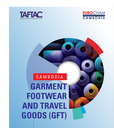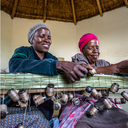
On 1 December 2022, amfori and the China Sustainability Tribune co-hosted the 27th Sino-European CSR Roundtable Forum online.

On 1 December 2022, amfori and the China Sustainability Tribune co-hosted the 27th Sino-European CSR Roundtable Forum online.

Following the completion of the pilot for Speak for Change, amfori Supply Chain Grievance Mechanism programme, amfori organised a series of events on “Responsible Business Conduct and Access to Remedy” in Vietnam. The events aimed to seek feedback from stakeholders’ experience related to access to remedy and develop strategies to improve the mechanism and ensure the successful scale-up to other countries.

On the day set aside by the UN to put a spotlight on the pressing environmental challenges the world is facing, amfori is calling on all retail companies, including its own retail members, to commit to the goals of the Race to Zero Retail Breakthrough Campaign.

amfori stands ready to help members with EUDR implementation

As an organisation that has been supportive of the move to introduce EU-wide due diligence measures since the onset, amfori welcomes this important step towards creating harmonised rules and a level playing field on due diligence.

B20 India Inception Meeting

On 8 June, amfori and China Sustainability Tribune hosted the 28th Sino-European CSR Roundtable Forum in Beijing themed “Fostering Carbon Reduction Partnership in Supply Chains".

amfori, the leading global business association for open and sustainable trade, and ITC sign a Memorandum of Understanding

On 7 December 22, more than 150 textile sector stakeholders from across the globe joined the GIZ FABRIC Hybrid Regional Conference on Textiles Sustainability where good practices for sustainable business and fair production were presented and the Asia Garment Hub was accentuated with a strong focus on regional exchange and dialogue.
The "Common Framework for Responsible Purchasing Practices" now provides an aligned reference document for the garment industry. Several multi-stakeholder initiatives have developed the document and hope that the framework will help to focus attention on the changes needed, as a contribution to improved impact.

Today, Quizrr, an EdTech provider of human and labour rights training, announced the launch of a worldwide program that will educate workers in global supply chains on labour rights.

Parental leave is just one of many topics that workers in factories needs to learn more about. With 16 weeks stipulated by law it is quite generous from an international perspective, but with many factories lacking effective training tools, and many workers unable to read and write, this is sadly often missed.

With a lack of women in leadership roles, and in professional and technical jobs the gender gap is yet far from being closed. Quizrr, an ed-tech pioneer is working to empower women, and men across the globe with awareness and skills to change that

The United Nations Capital Development Fund (UNCDF) together with wagely a consortium of Quizrr and Ulula have committed $556,000 to improve the financial and digital inclusion of garment workers.

Nationwide vaccination campaigns are at the forefront of COVID-19 mitigation efforts in several of the world’s major manufacturing countries. Garment workers— a category of people that has suffered since the pandemic took hold — are the focus of these vaccination campaigns.

The International Labour Organization (ILO) has launched a Behaviour Change Awareness Campaign to identify and reduce the COVID-19 risks faced by ready-made garment (RMG) workers in Bangladesh.

The long-standing partnership between BRAC University and BKMEA has been renewed.

Data from Mapped in Bangladesh (MiB) have provided valuable support to Cornell University School of Industrial and Labor Relations (ILR)’s Global Labor Institute study conducted jointly with Schroders, titled “Fashion’s Climate Breakdown and its Effect for Workers”. These data have also been instrumental in analyzing the impact of #climatechange on workers in #Bangladesh.BRAC University’s Centre for Entrepreneurship Development (CED) [CED-BRAC University] conducted KIIs for this report with ten #RMG factory managers in the #Dhaka division and in FGDs with approximately 35 workers.
We're delighted to announce that we have appointed The Communications Department as our international #outreach partner, who will support us with expanding MiB's presence in the #UK and #Europe.Director Tash Nikolovski visited Bangladesh in September for a series of workshops with our team, local press contacts, and our funders to understand how key actors are using #MiB data here in #Bangladesh and to inform our international outreach #strategy.
With the COVID-19 pandemic provoking a global health and economic emergency, the OECD’s Dorothy Lovell looks at how OECD guidance on responsible business conduct can help governments and business address the impacts of COVID-19 in a way that mitigates harm to workers and supply chains in the garment sector.
GMAC and GIZ FABRIC warmly invite you to attend our first post lockdown, physical Asian Dialogues conference.

The Responsible Business Hub (RBH), in collaboration with GIZ FABRIC Cambodia, is delighted to announce the commencement of a training program in partnership with the Cambodian Garment Training Institute (CGTI).

Upcoming EU legislation on Human Rights and Environmental Due Diligence (HREDD) will not only be important for companies in the European Union. But, it will have a direct impact on workers in production countries upstream in the supply chain.

Grievance mechanisms play a crucial role in improving working conditions in the garment and footwear industry.

The Responsible Business Hub (RBH) with the support from the GIZ FABRIC Cambodia in partnership with Cambodian Garment Training Institute (CGTI), will conduct 2 days training on “Due Diligence”.

This Sector Brief provides insights into the current state of the Garment, Footwear, and Travel Goods (GFT) sector in Cambodia, based on publicly available and official statistics. It focuses on the performance and trends observed in the sector, specifically examining the first four months of 2023 (M4 2023).

In Cambodia, workers are often unaware of national labour law and health and safety regulations. The regional GIZ project FABRIC addresses this issue with the mobile application called ‘Seth Yerng - Our Rights’ which aims to improve textile workers' knowledge of occupational health and safety issues and legislation.

The future of work will include homes and small workshops in ways we once never thought possible. Amidst this pivotal global moment, Nest is offering tools for the industry as we navigate new production models outside the four-walled factory.

The second cycle of TIWW purchasing practices metric is now open. The global Partnership Index™ survey opens for its second cycle from 3 - 31 October 2022, calling on manufacturers in the apparel sector to rate their brand partners’ purchasing practices.